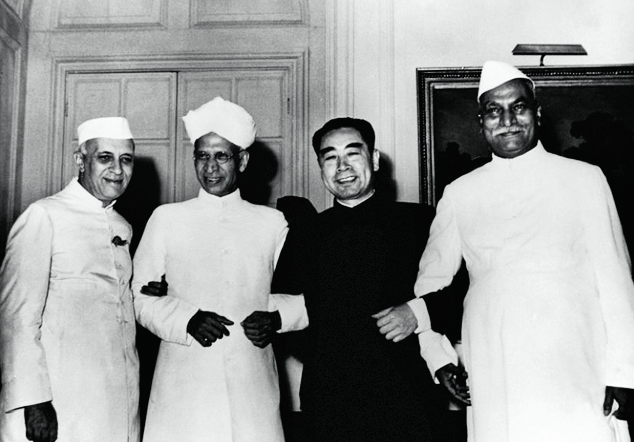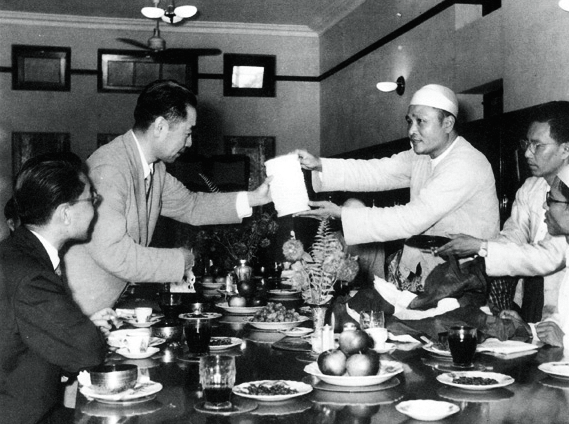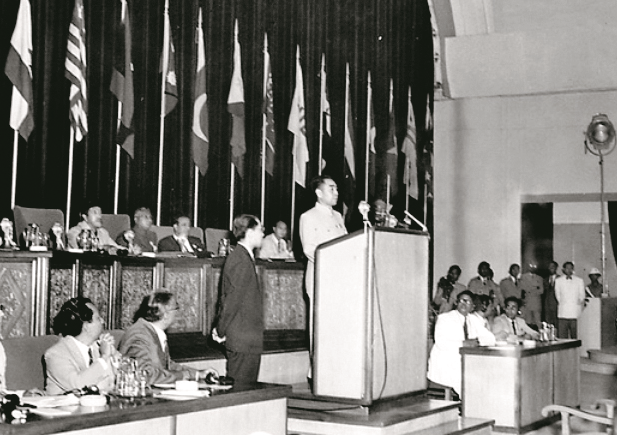How is the five principles of peace coexistence formed
Author:Hebei Communist Member Time:2022.09.02
The proposal of the five principles of peace in peace is an important milestone in the history of New China ’s diplomatic history, which has played a positive role in promoting the establishment of a fair and reasonable international political and economic order. So, as a basic criterion and principles of international law, how is the five principles of peaceful coexistence?
Historical origins and proposed background
The five principles of peace coexistence are the specific reflection of the diplomatic thoughts and collective wisdom of the diplomats such as Mao Zedong and Zhou Enlai. Target. In April 1949, after the "Perinerian Incident", Mao Zedong proposed in the drafted "A Statement of a spokesman for the People's Liberation Army Headquarters for British Warships". Relations, this relationship must be based on the basis of equality, mutual benefit, mutual respect for sovereignty and territorial integrity. "It can be seen that at this time, Mao Zedong has begun to consider the issue of diplomatic principles in New China. Locate the prototype of the five principles.
In September 1949, the "Common Program" adopted by the Chinese People's Political Consultative Conference with a temporary constitution, the following provisions on foreign policy: "The principle of foreign policy of the People's Republic of China is to ensure the integrity of the country's independence, freedom, and territorial sovereignty. Support international persistence peace and friendly cooperation between people from various countries, and oppose the policies and war policies of imperialism. "This regulation put forward some important ideas on the five principles of peace in peace. On October 1st, Chairman Mao Zedong announced to the world in Tiananmen City: "Any foreign government willing to abide by the principles of equality, mutual benefit, and mutual respect for territorial sovereignty is willing to establish diplomatic relations with it." Opened a new page of China's diplomacy.
Zhou Enlai proposed for the first time that China, India, Myanmar advocated it together
India is a neighboring country in China and one of the first countries that recognize New China (December 30, 1949) and establish diplomatic relations (April 1, 1950) with our country. In history, both countries have a history of being oppressed by Western colonialism for a long time, and they have the demands of pursuing national independence and freedom. After establishing a new country, the two countries are facing the common tasks of peaceful construction of the country. The solid foundation of friendly cooperation diplomatic relations. However, there are still some problems in the relationship between the two countries that need to be resolved urgently, especially on the border issues and Tibet issues. influences. After establishing diplomatic relations between the two countries, they have been negotiating on these issues. In order to successfully negotiate, Premier Zhou Enlai adhered to the principles and served people with a lot of effort.

On December 31, 1953, Zhou Enlai met with the Indian government delegation.
On the evening of December 31, 1953, Zhou Enlai met with all members of the government delegation of China and India in the West Flower Hall of Zhongnanhai. He said: "After the founding of New China, the principle of dealing with the relationship between China and India has been established, that is, they respect each other territorial territories. The principles of sovereignty, non -infringement, non -interference in the internal affairs, equality and reciprocity, and coexistence of peaceful coexistence. "This is the first time Zhou Enlai has systematically proposed the five principles of peace coexistence. On the basis of the five principles of peace in peace, the negotiations between the two sides were smooth, and the atmosphere was also harmonious and friendly. On April 29, 1954, the two sides reached the "Agreement on Trade and Transportation between Tibetan and India in Tibet, China", and wrote the five principles of peaceful coexistence into prefaces. As a result, the five principles of peaceful coexistence have become the basic criteria for New China to appear on the international stage and deal with the relationship between the country and the country.
On June 28, the Prime Minister of China and India issued a joint statement drafted by Nahru and after specific negotiations between the two parties. It should also be the criterion for guiding the relationship between China and India and the world. In the joint statement of China and India, the original "equal and mutual benefit" was changed to "equal and mutually beneficial". On the same day, Prime Minister Zhou Enlai conducted a friendly interview with Myanmar at the invitation of Burma Prime Minister Wu Nu and had talks with Premier Wu Nu. On the 29th, the Prime Minister of China and Myanmar issued the "Joint Statement" to confirm the five principles of peace coexistence "the principle of guiding the relationship between China and Myanmar." The five principles of peace coexistence are jointly advocated by China, India, and Myanmar, and have been widely responded to the international community.

In June 1954, Zhou Enlai visited Myanmar with Myanmar Prime Minister Wu Nu.
In October 1954, China and the Soviet Union signed the "Friendly Alliance Mutual Assistance Treaty", which pointed out in the joint declaration issued by the two parties that the two governments will strictly abide by the five principles of peaceful coexistence in the relationship with Asia -Pacific countries and other countries, and they will also Modify the first principle of the initial principle of "mutual respect for territorial sovereignty" to "mutual respect for sovereignty and territorial integrity".
The influence continues to expand, becoming a guidelines for international relations
In April 1955, 29 Asian -African countries headed a Asian -African conference in Wandong, Indonesia. This is the first international conference that was sponsored by the Asian -African countries themselves. It mainly discusses world peace. Friendly cooperation relationships and national independence and sovereignty in society and other areas opposed to colonialism. At the meeting, the five principles of peace coexistence were widely recognized. However, due to the overthrows of the United States, a few national representatives opposed the five principles of the peaceful coexistence. Zhou Enlai tried the situation and responded flexibly. In supplementing his speech, he clearly proposed the principle of "seeking common ground while depositing differences", and was approved by most countries. The "Asian and African Conference's Final Gazette" absorbed the suggestions of the Chinese delegation and formed ten principles of peaceful coexistence and friendly cooperation. Although the ten principles of the ten principles are different from the five principles of the peaceful coexistence, it includes the full connotation of the five principles of peace coexistence, so that the five principles of peace coexistence are reflected and extended. On April 19, 1955, Premier Zhou Enlai made a supplementary speech at the Bandung's meeting and put forward the principle of "seeking common ground while shelving differences".

In February 1956, at the 20th National Congress of the CPSU, Khrushchev proposed in the report that he hoped that the United States and the Soviet Union would deal with the relationship between the two countries in accordance with the five principles of peace. This shows that the five principles of peace coexistence at the time were greatly influenced at the time.
From the end of 1963 to the beginning of 1964, Premier Zhou Enlai visited 14 countries in Africa and Europe, and proposed the eight principles of my country's economic assistance, and the five principles of peaceful coexistence expanded to the economic field.
In 1970, the 25th of the Federal University passed the "Declaration of the International Law Principles of the Establishment of Friendly Relations and Cooperation in accordance with the United Nations Charter in accordance with the United Nations Charter", which clearly included the five principles of peaceful coexistence. In 1974, in the "Declaration on Establishing a New International Economic Order" adopted by the 6th Special Federal University of the United Nations, it clearly includes the five principles of peaceful coexistence.
In February 1972, the China -US Shanghai Bulletin issued by the two countries after President Nixon's visit to China proposed that in accordance with the "five principles of peace to deal with the five principles of the peaceful coexistence to deal with the relationship between the country." In September 1972, the joint communiqué issued by China and Japan was written into all the contents of the five principles of peaceful coexistence. In August 1978, the Peace Friendship Treaty signed by China and Japan and the Bulletin Bulletin of the Sino -U.S. In May 1989, Gorbachev visited China to achieve normalization of Sino -Soviet relations. In a joint bulletin issued by the two countries, it proposed that it was developed on the basis of the five principles of peace coexistence.
Since entering the 21st century, the five principles of peaceful coexistence have become an important cornerstone of the basic criteria for dealing with international relations, solving international disputes, and establishing a new order of international political economy. For more than 60 years, the five principles of peace coexistence have undergone the test of history, have been widely recognized by the international community, enriched and developed the principles of international law with the UN Charter as the core, and became a initiative in the history of international law and international relations. Has made important contributions.
- END -
Longtan District, Jilin City to carry out special service actions to help companies relieve rescue
A few days ago, the Longtan District Committee of Jilin City and the district government carried out the theme activities of Assisting Enterprises to resist epidemic prevention, help enterprises to r
Mid -Autumn Festival, Shenzhen Longgang's love relay helps thousands of miles to reunite ...

At 8 am on September 9th, a high -speed rail that drove to Ji'an, Jiangxi slowly d...